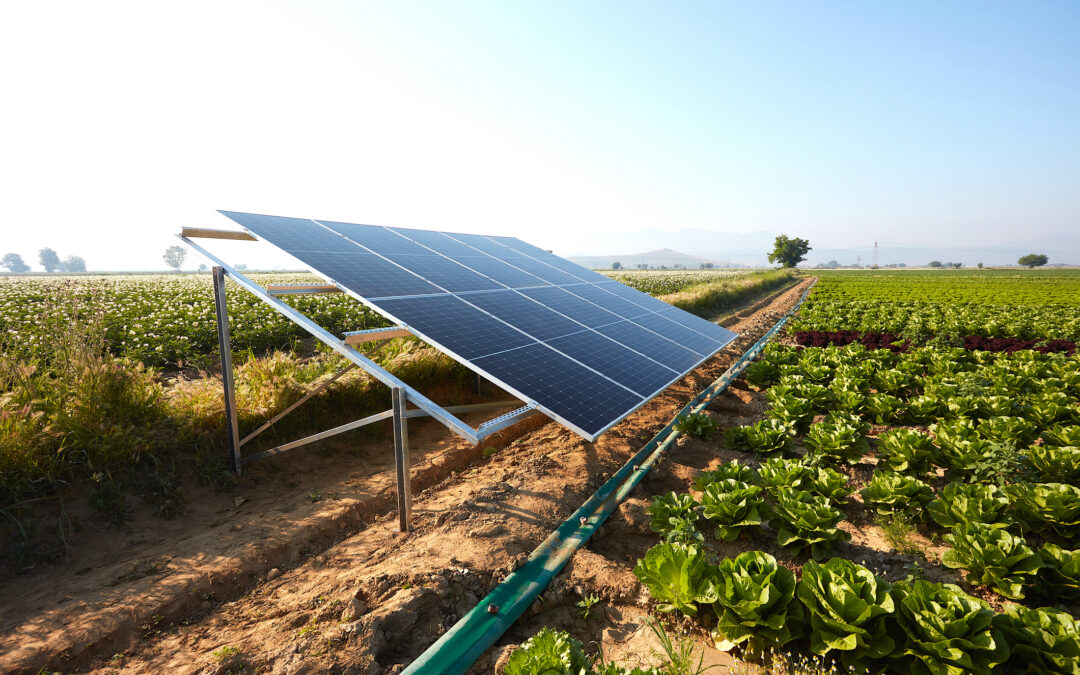Solar energy has emerged as a game-changer in the agricultural sector, offering numerous benefits beyond financial savings. As farmers increasingly embrace renewable energy solutions, it’s essential to recognize the significant environmental advantages that solar power provides. In this blog, we’ll delve into the environmental benefits of solar energy for farmers, highlighting its role in promoting sustainability, reducing greenhouse gas emissions, conserving natural resources, and safeguarding ecosystems.
Promoting Sustainability
One of the foremost environmental benefits of solar energy for farmers is its contribution to sustainability. Unlike fossil fuels, which are finite resources that contribute to air and water pollution, solar power is renewable and abundant. By harnessing sunlight to generate electricity, farmers can reduce their reliance on non-renewable energy sources, thus promoting long-term sustainability in agricultural operations.
Reducing Greenhouse Gas Emissions
Solar energy plays a crucial role in mitigating climate change by reducing greenhouse gas emissions. The combustion of fossil fuels for electricity generation is a major contributor to carbon dioxide (CO2) emissions, a primary greenhouse gas responsible for global warming. In contrast, solar panels produce electricity without emitting CO2 or other harmful pollutants, making them a clean and environmentally friendly energy source for farmers.
Conserving Natural Resources
Traditional energy production methods, such as coal mining and natural gas extraction, have significant environmental impacts, including habitat destruction, soil erosion, and water pollution. Solar energy, on the other hand, requires minimal natural resources for operation. By generating electricity from sunlight, farmers can help conserve precious natural resources like land, water, and fossil fuels, preserving ecosystems and biodiversity.
Safeguarding Ecosystems
Rooftop solar installations have minimal impact on surrounding ecosystems compared to conventional energy infrastructure. Large-scale solar projects can be sited on degraded or underutilized land, reducing the need for land conversion and habitat destruction. Additionally, solar panels produce no noise or air pollution, minimizing disturbances to wildlife and ecosystems. By embracing solar energy, farmers can help safeguard local ecosystems and promote environmental conservation.
Enhancing Air and Water Quality
The adoption of solar energy can lead to improvements in air and water quality, benefiting both human health and the environment. Unlike fossil fuel power plants, which release pollutants such as sulfur dioxide, nitrogen oxides, and particulate matter into the air, solar panels produce electricity without emitting harmful pollutants. By reducing air pollution, solar energy helps mitigate respiratory diseases and improve overall air quality in farming communities. Furthermore, solar energy production requires minimal water compared to conventional power plants, reducing water consumption and minimizing strain on local water resources.
Additional Solar Energy Benefits
Solar energy offers a plethora of benefits beyond its environmental advantages. Here are some additional benefits of solar power:
- Energy Independence: Solar panels provide homeowners and businesses with greater energy independence by generating electricity on-site. This reduces reliance on centralized power grids and fossil fuels, giving individuals and communities more control over their energy supply. In rural areas or during natural disasters, solar energy systems can provide a reliable source of power when traditional electricity sources are unavailable.
- Financial Savings: Investing in solar energy can lead to significant long-term financial savings. By generating their own electricity, homeowners and businesses can reduce or eliminate their monthly electricity bills. Additionally, solar panel installations typically increase property values, providing a return on investment (ROI) over time. With financing options such as solar loans and leases, the upfront costs of solar installations are becoming increasingly affordable, allowing more people to access the financial benefits of solar power.
- Job Creation and Economic Growth: The solar industry is a major source of job creation and economic growth. As demand for solar installations continues to rise, so does the need for skilled workers in manufacturing, installation, sales, and maintenance. Solar projects also stimulate local economies by generating tax revenues and attracting investment. By supporting the growth of the solar industry, communities can create new job opportunities and stimulate economic development.
- Grid Stability and Resilience: Solar energy can enhance the stability and resilience of power grids. Distributed solar installations decentralize electricity generation, reducing strain on centralized power systems and improving grid reliability. During peak demand periods or emergencies, solar power can help stabilize the grid by providing additional electricity generation capacity. By integrating solar energy into existing infrastructure, communities can enhance grid resilience and ensure a more reliable supply of electricity.
- Technological Innovation: The adoption of solar energy drives technological innovation and advancements in renewable energy technologies. Research and development efforts in solar power are leading to more efficient solar panels, energy storage solutions, and grid integration technologies. These innovations are making solar energy more accessible, affordable, and scalable, paving the way for a sustainable energy future.
Investing in Sustainability
The environmental benefits of solar energy for farmers are numerous and significant. From promoting sustainability and reducing greenhouse gas emissions to conserving natural resources and safeguarding ecosystems, solar power offers a clean, renewable energy solution that aligns with the principles of environmental stewardship. By embracing solar energy, farmers can not only reduce their environmental footprint but also contribute to a healthier, more sustainable future for agricultural communities and the planet as a whole.
Cedar Creek Energy specializes in creating customized solar solutions tailored to the unique needs of farms and agricultural operations. Our team of experts works closely with farmers to understand their energy requirements, agricultural practices, and long-term goals. We conduct thorough site assessments to determine the most suitable locations for solar panel installations and design bespoke systems that optimize energy production and efficiency. We can design and install a solar energy system that meets your specific needs. With our commitment to quality, reliability, and customer satisfaction, Cedar Creek Energy is your trusted partner for implementing sustainable energy solutions on your farm. Contact us for a free solar bid.

